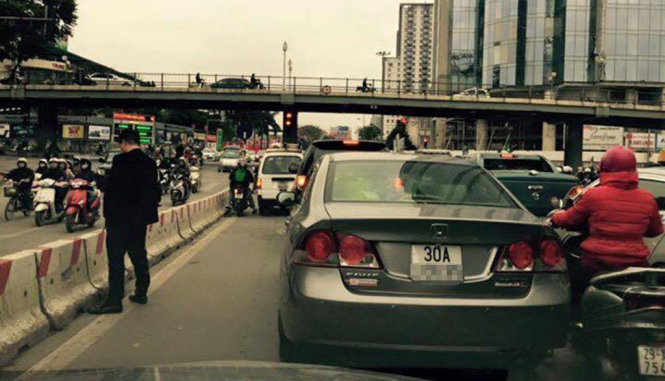Motorists stopping to pee in the middle of a busy highway, vendors over-charging tourists, and scams rampant throughout the city – what’s going on? Reading the local headlines I get the impression that people just don’t care about the consequences of their actions. And why should they? It seems no one cares and no one is going to stop it. A feeling of impunity is in the air.
Impunity means to be free from the consequences of your actions – and many people believe their actions lack all repercussion. Another relevant adjective is ‘blatant’ – not bothering to hide or feel shame for what you are doing. I see this often on my commute from Hoi An to Da Nang for work or when I’m just hanging out coffee shops.
It’s not exactly a positive impression for busloads of tourists roaring down the coastal highway to Da Nang to see rich people jump out of their overpriced SUVs for a pee on the side of the road or the construction guy do the same, except his motorbike is better parked. Just two days ago, next to the grounds of the new Buddha shrine in Da Nang, an old woman squatted in full view of the passing traffic to relieve herself. Eww...
It’s worth mentioning that I have never witnessed that in Thailand, Cambodia, or Malaysia.
What will tourists tell their friends back home of dual pricing, rip-offs, and poor service? Of waiters picking their noses or waitresses hurling food at guests? If word-of-mouth advertising is the best free advertising, then the impressions of Vietnam might be better left unsaid.
One school of thought about lousy service, shopping, and tour disasters is that it doesn’t matter because tourists will never be back so why bother with consideration and manners? Impunity in action...I think. Another common notion is that you have to pee immediately, wherever you are, as it’s unhealthy to ‘hold it in.’ That’s true, if you hold it for a long time, not just for a few minutes as you find a discrete place to ‘do your business.’ It doesn’t take that long to find a bush! It’s not only impunity in action but also a horror to onlookers.
It’s the blatantness of these actions, combined with the belief that people don’t need to change their ways in consideration of others, that creates unnecessary problems. The “I can so I will” attitude is a result of education, parenting, and social class. Whether it is entitlement from economic stature or scamming a customer that won’t be returning, the lack of foresight and concern is a childish mannerism that has remained uncorrected in adulthood.
These problems aren’t restricted to Vietnam; texting in traffic, refusing to give correct change, and hidden fees on the bill that no one bothers to mention are common in any country. Throughout the world, tour guides take unsuspecting customers unknowingly to a shop for commission, hotels overcharge in the low season, and the taxi drivers drive in circles and never seem to have change. It would be depressing except Vietnam’s got great beaches and cheap beer!
But change is coming. Slowly and painfully. Western expectations of service and manners are creeping into the better examples of hospitality and fair trading that are springing up all over the country. While a lot of these examples have some western input by western management and business practices, a lot of experienced, well-traveled Vietnamese are getting the idea.
It may never fix the primitive image I now have engrained in my head of someone peeing next to the road, but if I ever see it again you can bet I won’t be doing business with them. Acts of impunity can only be overcome, in my opinion, when we speak up, protest, and make it clear whenever behavior is unreasonable and unacceptable.
For older generations, mostly living in a traditional world outside major cities, protest is difficult and, at times, socially dangerous. Recent rapid wealth in cities is producing a more arrogant and selfish attitude towards life, money, and consideration towards others. However, improvement in the education younger generations are receiving in this country can make the difference and quietly transform the nation.
While the young may never be able to tell the old what to do, old ways do die out. Today’s youth will become the nation’s next policemen and leaders – better trained, educated, and more aware of modern expectations. There is great energy and optimism in Vietnam and that’s the nation’s greatest asset – here’s hoping that my student’s generation speaks up louder.
And one day, I’d like to think that I’ll ride along that highway and only have to avoid the cows ‘doing their business.’



















































